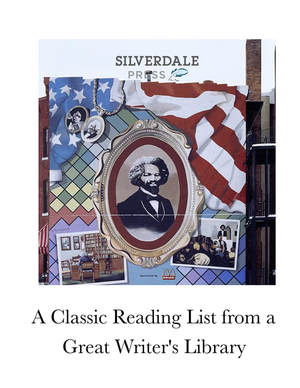 "What should I read? What should my kids read?" These two questions occupy the homeschool mom during the carefree summer months, as well as during the school year. One way to be sure your children are reading the best books is to dig into the reading lists of the great men and women of history. Great men and women often read voraciously. Their books were high quality in both thought and prose. What flowed out of their pens, words, and actions was a reflection of what they “fed” themselves through books. For great writer and influential abolitionist Frederick Douglass, learning to read did not come easily. Douglass was born into slavery. When he was a slave boy, his mistress taught him “the A, B, C,” he recalled in his autobiography. Under the threat of her husband, who did not want young Frederick to read, his mistress stopped her literary training. But this only increased Frederick's determination. “Though conscious of the difficulty of learning without a teacher, I set out with high hope, and a fixed purpose, at whatever cost of trouble, to learn to read.” And young Frederick did teach himself. He tricked neighborhood boys into teaching him. He practiced reading newspapers when nobody was watching. And he learned how to write by secretly tracing the copywork of his master’s young son. “When left thus, I used to spend the time in writing in the spaces left in Master Thomas’s copy-book, copying what he had written…Thus, after a long, tedious effort for years, I finally succeeded in learning how to write.” Frederick diligently sought literary self-training because he knew that it was the key to his freedom. And it was. Indeed, there is wisdom and freedom in the old methods of learning! We all want our kids to be great writers, thinkers, leaders, and citizens. And imitating the reading habits of the great men and women of history will help us go far in achieving this goal. So, what did Frederick Douglass read? Fortunately, the National Park Service has a list of the books he had in his personal library. We’ve gone through them and selected a list of books that would be perfect for homeschool families, for the summer and beyond. The works in Douglass’s library are fascinating and important, having shaped the course of Western civilization. (And the good news is that many of them are out of copyright and are available for free online!) The Cricket on the Hearth by Charles Dickens Bleak House by Charles Dickens The Count of Monte Cristo by Alexandre Dumas The Three Musketeers by Alexandre Dumas History of the Decline and Fall of the Roman Empire by Edward Gibbon Northwood; Or Life North and South by Sarah J. Hale The House of Seven Gables by Nathaniel Hawthorne The Odyssey by Homer The Illiad by Homer Missionary Travels and Researches in South Africa by David Livingstone The American Conflict by Horace Greeley The Autocrat of the Breakfast Table by Oliver Wendell Holmes The Life and Voyages of Columbus by Washington Irving Twelve Years a Slave by Solomon Northup A Journey through Texas by Frederick Law Olmsted Mary Stuart: A Tragedy by Friedrich Schiller Notes from the Plymouth Pulpit by Henry Ward Beecher The Fair Maid of Perth by Sir Walter Scott The Farm and the Fireside by John Blake Works of Harriet Beecher Stowe by Harriet Beecher Stowe The Complete Works of Shakespeare by William Shakespeare Selected Poems by William Wordsworth The Life of William Wilberforce by Robert Isaac Wilberforce Heartsease by Charlotte M. Yonge Practicing the habits of great leaders, writers, thinkers, and citizens is at the heart of our mission at Silverdale Press. That mission is reflected in our new 36-week language arts curriculum, Persuasive Writing and Classical Rhetoric: Practicing the Habits of Great Writers. Parents need not worry about doing writing instruction. We, along with the world’s greatest writers, do all the work for you. In each lesson, we profile a great writer, telling you all about his or her reading habits.
0 Comments
Leave a Reply. |
Silverdale PressCheck out our About Page to learn more about us! Categories |

 RSS Feed
RSS Feed